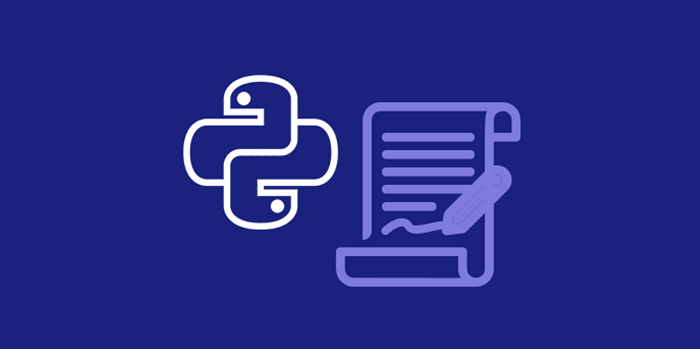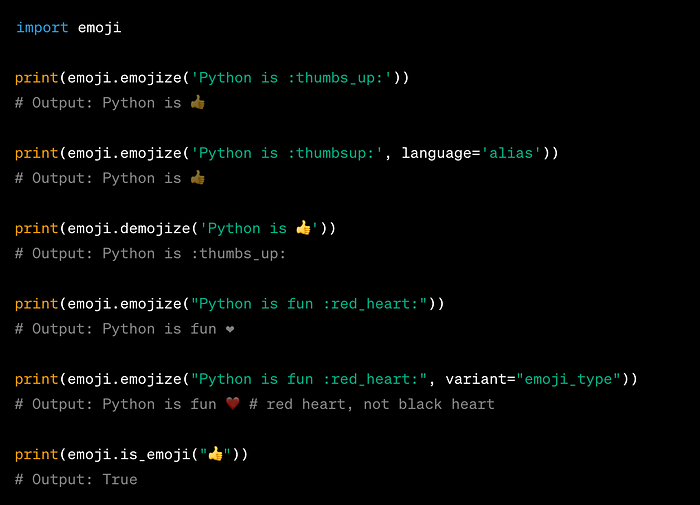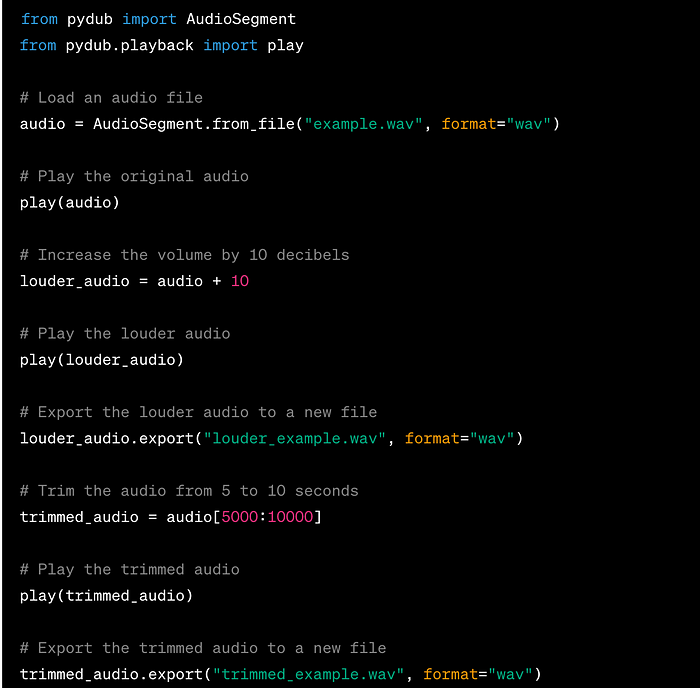🍄13 Fun Python libraries to make your day better❤️❤️❤

In this article, I’ll introduce 13 enjoyable Python libraries that I’ve explored and found entertaining. These libraries not only add a touch of fun to programming but also serve practical purposes, ranging from game development and web scraping to audio processing and GUI design. Whether you’re a beginner looking for interactive ways to learn programming or an experienced developer seeking to infuse creativity into your projects, these libraries offer a diverse range of possibilities.
- Pygame (pygame)

Pygame is a delightful library that brings the joy of game development to Python. With a focus on simplicity and ease of use, Pygame provides a set of modules for creating 2D games. It handles tasks like drawing graphics, managing events, and playing sounds, making it an excellent choice for both beginners and experienced developers. From creating your first game to more complex projects, Pygame empowers you to explore the exciting world of game development in Python.
pip install pygame2. Turtle (turtle)

Turtle is a built-in Python library that introduces programming through a graphical interface. It’s particularly popular for teaching programming concepts to children. With Turtle, you can draw colorful shapes and patterns on the screen by controlling a turtle cursor. The simplicity and interactivity of Turtle make it a playful way to grasp fundamental programming ideas, providing a hands-on experience for learners of all ages.
3. Pillow (PIL Fork) (Pillow)

Pillow, the friendly fork of the Python Imaging Library (PIL), is a versatile image processing library. It equips developers with powerful tools to manipulate images, such as resizing, cropping, and applying filters. Whether you’re enhancing photos or automating image-related tasks, Pillow makes image processing in Python both enjoyable and efficient.
pip install Pillow4. Beautiful Soup (beautifulsoup4):

Beautiful Soup is a web scraping library that adds a touch of elegance to the process of extracting information from web pages. Its intuitive API allows you to navigate HTML or XML documents with ease, providing a Pythonic interface for tasks like searching, modifying, and extracting data. Beautiful Soup’s flexibility and readability make web scraping projects not only productive but also enjoyable.
pip install beautifulsoup45. Emoji (emoji):

The Emoji library brings a dose of fun and expressiveness to your Python applications by allowing easy integration of emojis. Emojis convey emotions, reactions, and sentiments, adding a playful dimension to text-based interactions. Whether you’re working on a chat application or simply want to infuse some personality into your code, the Emoji library offers a delightful way to enhance the user experience.
pip install emoji6. PyDub (pydub)

PyDub is a delightful library for audio processing in Python. It simplifies common audio tasks such as cutting, concatenating, and applying effects, making it accessible to both beginners and experienced audio enthusiasts. With PyDub, you can explore the world of sound manipulation, from creating personalized ringtones to experimenting with audio effects, all within the expressive and concise Python language.
pip install pydub7. Flask (Flask)

Flask, a micro web framework for Python, brings the thrill of web development to your fingertips. With a minimalistic design and easy-to-understand syntax, Flask is an ideal choice for building web applications and APIs. Whether you’re creating a personal blog or a dynamic web service, Flask empowers you to dive into the world of web development with enthusiasm and creativity.
pip install Flask8. Arcade (arcade)
Arcade is a modern Python framework designed for crafting engaging games with compelling graphics and sound. Its user-friendly interface and extensive documentation make it accessible to developers of all skill levels. Whether you’re a hobbyist or a professional game developer, Arcade encourages creativity and experimentation, offering a platform to turn your game development dreams into reality.
pip install arcade9. PyQt or PySide (PyQt5 or PySide2)
PyQt and PySide are Python bindings for the Qt framework, providing a powerful toolkit for building graphical user interfaces (GUIs). These libraries open the door to creating desktop applications with sophisticated interfaces, making the development process enjoyable and visually appealing. Whether you choose PyQt or PySide, you’ll find a wealth of resources and a supportive community to guide you through the exciting journey of GUI development.
pip install PyQt5 or pip install PySide210. Cowsay (cowsay)
Cowsay is a whimsical library that injects humor into the command line by rendering text messages as speech bubbles spoken by an ASCII art cow. While not intended for serious applications, Cowsay adds a lighthearted touch to command-line interactions. It’s a playful way to surprise and amuse users, making even routine tasks a source of joy in the world of terminal-based applications.
pip install cowsay11. Colorama
Colorama is a lightweight Python library designed to make terminal text colorful and vibrant. It provides an easy way to add color to terminal text, making command-line interfaces more visually appealing. Colorama works across different operating systems and can be a great addition to projects where visual feedback in the terminal is essential. Installation is straightforward:
pip install coloramaOnce installed, you can use Colorama to add colors to your terminal text with just a few lines of code.
12. Pycha

Pycha is a simple and fun library for creating visually appealing charts and graphs in Python. It is built on the Cairo library and provides an easy-to-use interface for generating various types of charts, including line charts, bar charts, and pie charts. To install Pycha, use the following command:
pip install pychaWith Pycha, you can quickly create professional-looking charts with just a few lines of code.
13. Faker

Faker is a delightful Python library for generating fake data, such as names, addresses, and phone numbers. It is useful for creating realistic test data or adding placeholder content to applications during development. To install Faker, use:
pip install fakerFaker allows you to create instances of its generators, providing random and plausible data.
Conclusion:
These libraries cover a range of fun and practical use cases, from game development and graphics to web scraping and audio processing. Depending on your interests, you can explore and experiment with these libraries to make your Python programming experience more enjoyable.
